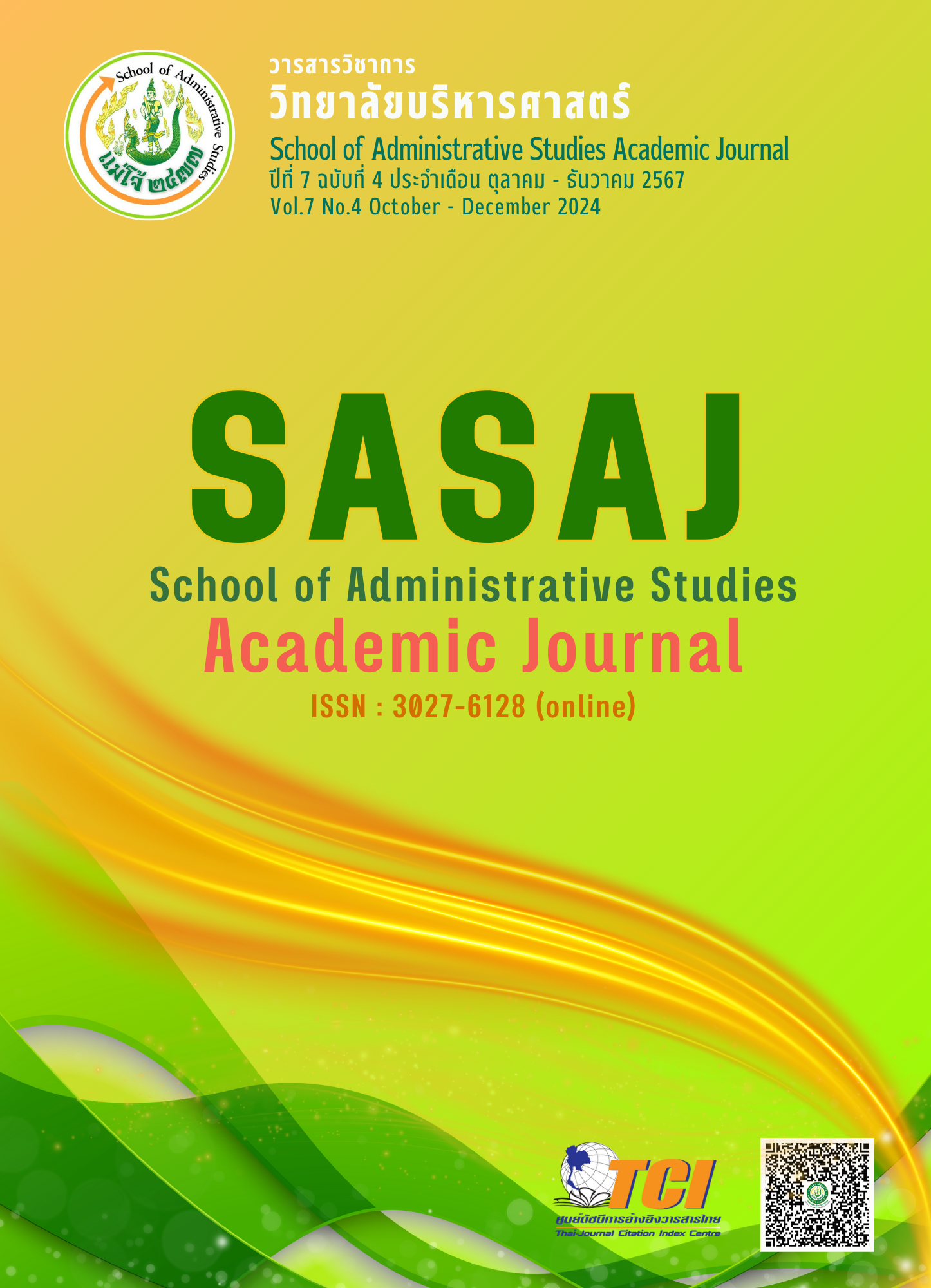Workaholism, Social Support and Job Burnout of Private Company Employees in Bangkok Metropolis
Main Article Content
Abstract
The purpose of this research were to study: 1) the level of workaholism, social support and job burnout of private company employees in Bangkok metropolis. 2) the relationship of workaholism with job burnout of private company employees in Bangkok metropolis. 3) the relationship of social support with job burnout of private company employees in Bangkok metropolis. The sample used in the research were 400 private company employees in Bangkok metropolis aged 25-60 years old. The data was collected by using a questionnaire consisting of personal information, the workaholism questionnaire with reliability at .847, the social support questionnaire with reliability at .822 and the job burnout questionnaire with reliability at .890. The statistics used in the research were frequency, percentage, mean, standard deviation, Pearson’s product moment correlation coefficient.
Data analysis found that 1) the subjects in the sample had overall workaholism, social support and job burnout at medium level. 2) the workaholism was positively correlated with job burnout of private company employees in Bangkok metropolis statistically significant at the .001 level (r = .347). 3) the social support was negatively correlated with job burnout of private company employees in Bangkok metropolis statistically significant at the .01 level (r = -.401).
Article Details

This work is licensed under a Creative Commons Attribution-NonCommercial-NoDerivatives 4.0 International License.
ลิขสิทธิ์
References
เจณิกา วังสถาพร. (2555). การติดงานและความผูกใจมั่นในงาน: สาเหตุเชิงแรงจูงใจ และผลด้านความเหนื่อยหน่ายในงาน (วิทยานิพนธ์ปริญญามหาบัณฑิต). จุฬาลงกรณ์มหาวิทยาลัย, กรุงเทพฯ.
ธันยวงศ์ เศรษฐ์พิทักษ์. (2558). ปัจจัยที่ส่งผลให้พนักงานออฟฟิศทำงานติดต่อกันเป็นระยะเวลานานและเป็นโรคคอมพิวเตอร์ซินโดรม (วิทยานิพนธ์ปริญญามหาบัณฑิต). มหาวิทยาลัยธรรมศาสตร์, กรุงเทพฯ.
ณัฐชนันท์พร ทิพย์รักษา. (2556). แรงจูงใจในการทำงาน ความบ้างาน และความสุขในการทำงาน (วิทยานิพนธ์ปริญญามหาบัณฑิต). สถาบันบัณฑิตพัฒนบริหารศาสตร์, กรุงเทพฯ.
ภานุวัฒน์ กลับศรีอ่อน. (2557). สภาวะบ้างาน: สาเหตุผลกระทบ และแนวทางการแก้ไข. วารสารปัญญาภิวัฒน์, 5(2), 11-30.
วรพล เจริญศรี. (2557). ความสามารถในการเผชิญและฝ่าฝันอุปสรรค การสนับสนุนทางสังคมและความเหนื่อยหน่ายในการทำงาน: กรณีศึกษา นักบัญชีของบริษัทแห่งหนึ่งในเขตกรุงเทพมหานคร (วิทยานิพนธ์ปริญญามหาบัณฑิต). มหาวิทยาลัยธรรมศาสตร์, ปทุมธานี.
ศิริชัย กาญจนวาสี. (2552). ทฤษฎีการทดสอบแบบดั้งเดิม. กรุงเทพฯ: คณะครุศาสตร์ จุฬาลงกรณ์มหาวิทยาลัย.
สำนักปลัดกรุงเทพมหานคร สำนักงานปกครองและทะเบียน (2565). การแบ่งพื้นที่เขตการปกครองของกรุงเทพมหานคร. สืบค้นจาก http://office2.bangkok.go.th/ard/?page_id=4048
อรสา ใจจินา, และ ภิญญาพันธ์ ร่วมชาติ. (2556). อิทธิพลของปัจจัยส่วนบุคคลและการสนับสนุนทางสังคมต่อความเหนื่อยหน่ายในการปฏิบัติงานของบุคลากรสาธารณสุขผู้รับผิดชอบงานสุขภาพจิตและจิตเวชนพื้นที่เครือข่ายบริการสุขภาพที่ 3. วารสารวิชาการศิลปศาสตร์ประยุกต์, 6(1), 2-7.
อัจฉรีย์ จันทลักขณา. (2549). สถิติเพื่อการวิจัย: เชิงคุณภาพ-เชิงปริมาณ ด้านภาษา ภาษาศาสตร์และพฤติกรรมศาสตร์. กรุงเทพฯ: โรงพิมพ์มหาวิทยาลัยเกษตรศาสตร์.
Andreassen, C. S. (2014). Workaholism: An overview and current status of the research. The Journal of Behavioral Addictions, 3(1), 1–11.
Cobb, S. (1976). Social Support as a moderator of life stress. Psychosomatic Medicine, 38(1), 300-314.
Cohen, S., & Wills, A. (1985). Stress, social support and the buffering hypothesis. Psychological Bulletin, 98(1), 310-357.
Meijman, T. F., & Mulder, G. (1998). Psychological aspects of workload. In P. J. D. Drenth, H. Thierry, & C. J. D. Wolff (Eds.), Handbook of work and organizational psychology. (pp. 5-34). Hove, UK: Psychology Press.
Maslach, C. (1986). Burnout: The Cost of Caring. New York, NJ: Prentice Hall.
Muldary, T. W. (1983). Burnout and health Professional manifestation and management. New York, NY: McGraw Hill.
Tabassum, A., & Rahman, T. (2012). Gaining The Insight of Workaholism, Its Nature and its Outcome: A Literature Review. Journal of Research Studies in Psychology, 2(2), 81-29.
Taris, T. W., Schaufeli, W. B., & Verhoeven, L. C. (2005). Workaholism in the Netherlands: Measurement and Implications for Job Strain and Work-Nonwork Conflict. Applied Psychology: An International Review, 54(1), 37–60.


